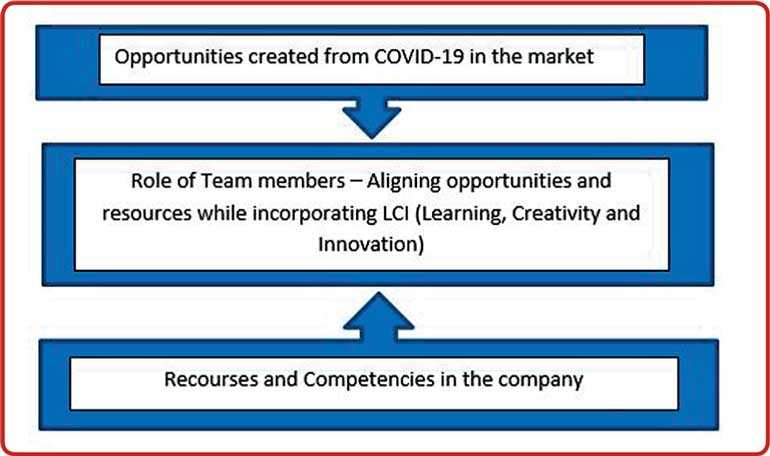Thursday Feb 19, 2026
Thursday Feb 19, 2026
Thursday, 30 April 2020 00:00 - - {{hitsCtrl.values.hits}}

Most of the businesses are struggling at the moment and there is a need to have different approaches to overcome this. We need to be more creative and innovative in this situation. Even we can learn best  practices in creativity and innovation from other countries.
practices in creativity and innovation from other countries.
Recently I have witnessed a good example in which Sri Lanka’s security forces were entertaining persons who are under self-quarantine in many areas. As you know the time of self-quarantine is really critical for the physical and psychological health of any person.
According to Prof. Ian Hickie at the University of Sydney’s Brain and Mind: “Prolonged quarantine or social isolation (without compensatory methods in place) will exacerbate anxiety, depression and a sense of helplessness “(cnbc.com).
Dr. Marcus Tan, a consultant psychiatrist at Singapore-based Nobel Psychological Wellness Clinic proposed the role of Government in this scenario as “by addressing some of these stressors, governments can help mitigate the impact that quarantine can have on mental health (cnbc.com)”. In this context we need to appreciate the role of Sri Lanka Police. Sri Lanka Police have done something different to entertain people in the most-needed time.
Examples from the world
Sri Lankan businesses also need to think different. According to Landry & Bianchini (1995): “The industries of the 21st century will depend increasingly on the generation of knowledge through creativity and innovation.” Even in the time of crisis such as this, you should be more creative and innovative.
Anyway, if you are more creative and innovative then you can easily achieve competitive advantage. Below is one of the classic examples of how one of the Chinese companies used “creativity and innovation” to promote products.
“With remote working and a new set of complex coordination challenges, many Chinese companies took to social media platforms, such as WeChat, to coordinate employees and partners. For example, Cosmo Lady, the largest underwear and lingerie company in China, initiated a program aimed at increasing its sales through WeChat, enlisting employees to promote to their social circles.
“The company created a sales ranking among all employees (including both the Chairman and CEO), helping motivate the rest of the staff to participate in the initiative.” (hbr.org/2020/03/how-chinese-companies-have-responded-to-coronavirus)
Companies needs to think differently and do something by looking at the context of environment and demand. “Some companies in China have created free life insurance products to provide short-term coverage customers from coronavirus for a period of time as a way to engage their customers.
“Foxconn in China repurposed some of its factories to make surgical masks instead of iPhone components. And luxury retailer LVMH, which owns Louis Vuitton and Christian Dior, is using its perfume production lines to manufacture hand sanitiser in Italy.” (www.forbes.com/sites/kweilinellingrud/2020/03/18/coronavirus-how-companies-and-leaders-are-responding-to-the-crisis/#1fb96bc25802)
There should be a different team in any business to read the situation, learn from success stories, be innovative and to adjust strategies accordingly. The organisation may be capable of doing many different things with their resources.
But there should be a change agent/s for any company to align the resources of the company and see the opportunities in the market. In this context, the way you incorporate Learning, Creativity and Innovation (LCI) is paramount.
Conclusion
By looking at some examples it is clear that there is a need to think different. You need to be more concerned about collaboration with the flavour of creativity and innovation. This is a testing period for all the businesses in Sri Lanka. You should learn success stories. Higher the creativity and innovativeness with customer orientation higher would be a competitive advantage for any businesses.
(The writer is a Professor in Management Studies at the Open University of Sri Lanka. You can reach him on [email protected].)